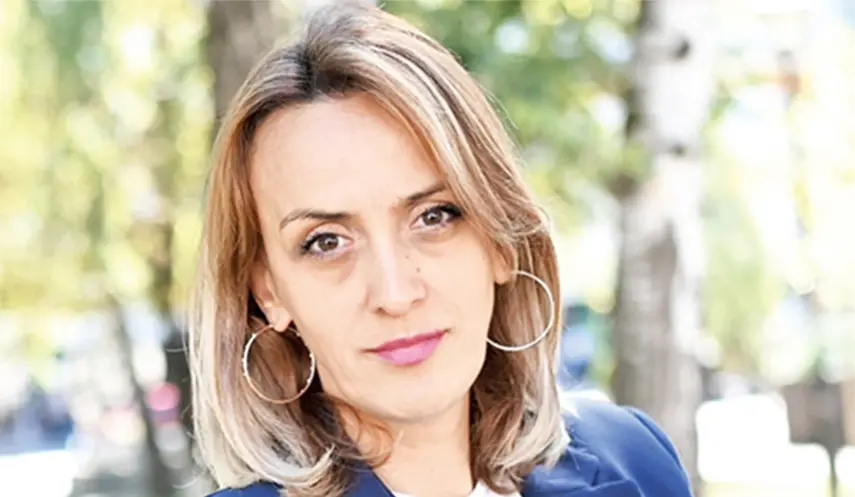GAĆANOVIĆ: DECISIVE RESPONSE TO THE SEIZURE OF SERBIAN CULTURAL SYMBOLS
Republika Srpska - Istočno Sarajevo - scientific gathering
10/03/2025
15:29

ISTOČNO SARAJEVO, OCTOBER 3 /SRNA/ - Serbian science has delivered a decisive response to the phenomenon of cultural appropriation and the seizure of Serbian cultural symbols, following the hysteria of Bosniak politicians and scholars from Sarajevo in the public sphere after the restoration of the Čajniče Gospel, Anđelina Ošap Gaćanović, a member of the Commission for the Preservation of National Monuments, told SRNA.
She noted that last night, at the Administrative Centre of the Government of Republika Srpska in Istočno Sarajevo, a collection of scientific papers was presented. The collection is the result of an international scientific conference held two years ago, which focused on the study of Serbian medieval written monuments /manuscripts/ from Bosnia and Hum, with a particular focus on the Čajniče Gospel.
Gaćanović reminded that the Čajniče Gospel was created over 600 years ago, in the very place where it is still preserved today, within the treasury of the Serbian Orthodox Church in Čajniče.
She noted that the restoration of this manuscript sparked political and identity-based attacks from Sarajevo during 2022 and 2023.
"First, a scholar of ‘Bosnian studies’ alarmed the public with a false report about an alleged appropriation of cultural heritage belonging to all ‘Bosnians and Herzegovinians’ and a supposed ‘Bosnian manuscript.’ Then, politically motivated members of the Commission for the Preservation of Monuments launched a campaign against the Serbian Orthodox Church, and even against political leaders of Srpska, accusing them of allegedly stealing the manuscript, at the same time that I raised the issue of amending and repealing the decision containing false information without any scientific basis," Gaćanović said.
She pointed out that the attackers presented to the public the Serbian manuscript Gospel from Čajniče as some kind of Bogomil manuscript, labeling it “Bosnian” because it supposedly originated within heretical communities that later readily converted to Islam.
According to her, the public is being led to believe that today’s Bosniaks are the true heirs of the Orthodox liturgical Gospel, while the Serbian Orthodox Church has "merely preserved it for 600 years."
"The response to these identity-based ideological and hysterical attacks has been provided through scientific research across multiple disciplines, and at last night’s conference, papers from 24 international institutions by respected scholars were presented," said Gaćanović.
She added that the collection includes research results from various fields, covering not only textual and orthographic analyses of the manuscript, but also in-depth studies of the biblical text’s meaning, analyses of its biblical and Christian character, an integrated perspective on such manuscripts, as well as the historical context in which it was created.
"An integral part also includes the results of physical, chemical, and other analyses and imaging carried out during the restoration and preservation of the manuscript," emphasized Gaćanović.
She assessed that all the combined results are outstanding and unequivocally establish that this manuscript is part of the Serbian medieval written tradition, created for a patron of the Orthodox faith who spoke the Serbian language, while also disproving the claim that the Holy Gospel had any Bogomil character.
"As one participant of the conference said last night, the era in which they ‘filled the gaps’ in their cultural identity and creativity by appropriating our cultural heritage and claiming it as ‘Bosnian,’ when they could not call it ‘heretical,’ has come to an end," stated Gaćanović.
In Istočno Sarajevo last night, the scientific collection Serbian Medieval Monuments from Bosnia and Hum: A Study of the Čajniče Gospel was presented, which, as noted, will contribute to the fight for the preservation of Serbian identity.
The works from various fields were presented by academician Branko Letić, professors Zorica Nikitović and Vladislav Topalović, and historian Dejan Došlić.

SERBS IN TEARS AND FEAR OVER OWNERSHIP OF ORTHODOX CEMETERIES AND CHURCHES

CVIJANOVIĆ DEMANDS ACCOUNTABILITY FOR SHAMEFUL CONCERT IN ŠIROKI BRIJEG

OSTOJIĆ URGES BiH AND EU TO ACT OVER GLORIFICATION OF FASCIST IDEOLOGIES





